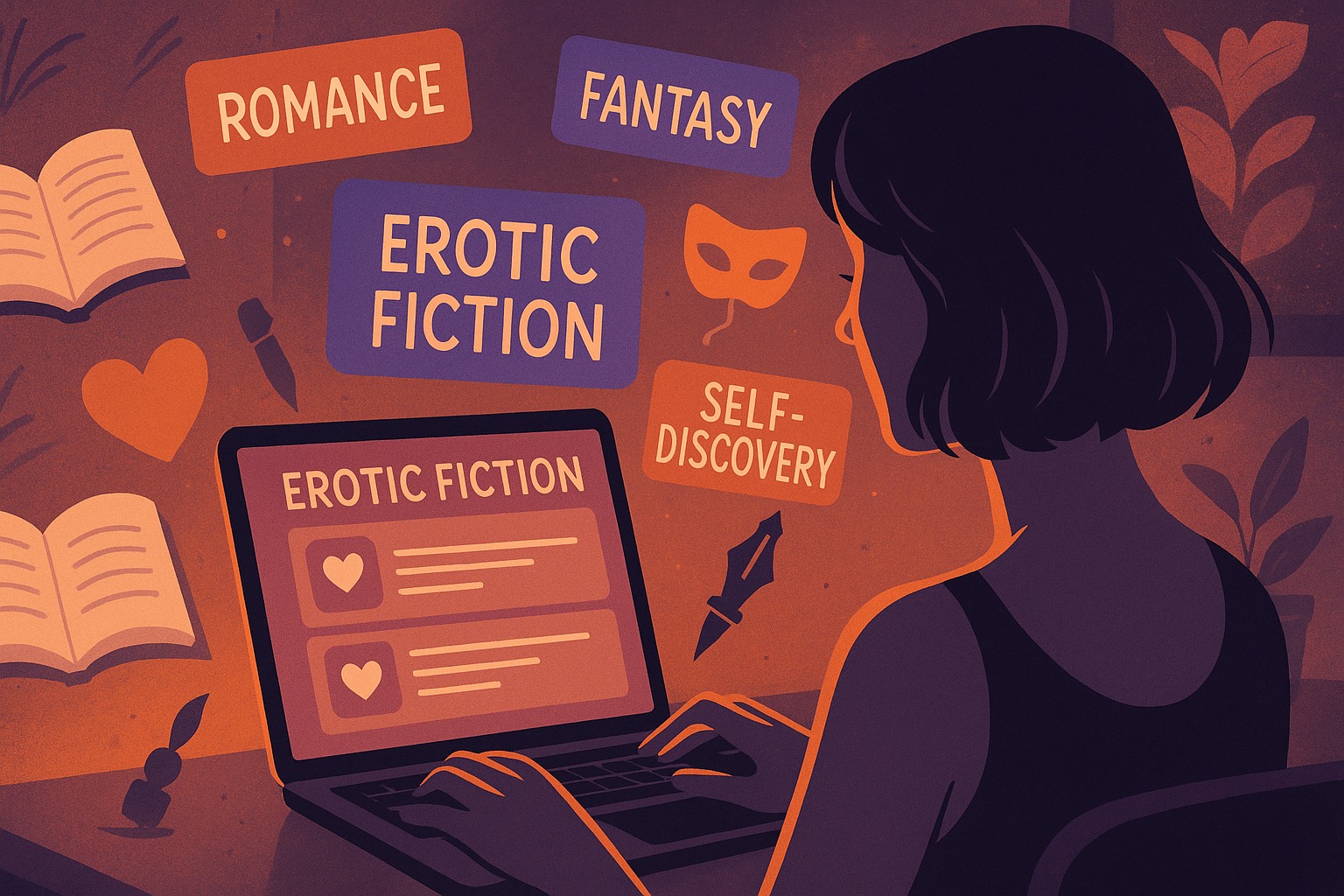Literoticatags: From Search to Self-Expression in Erotic Fiction refers to how tagging on platforms like Literotica helps readers find stories they love and lets writers express themes, identities, and desires. These tags act as both search tools and creative labels. They build connections, boost visibility, and shape inclusive online communities.
Stay tuned as we dive deeper into “Literoticatags: From Search to Self-Expression in Erotic Fiction,” where discovery meets identity in the world of adult storytelling.
What Are Literoticatags Used For?
Literoticatags are helpful labels or keywords that writers add to their stories on Literotica. They tell you what the story is about—like the theme, the type of relationship, the style, or the mood.
For example, a story about a secret romance at work might have tags like #OfficeRomance or #ForbiddenLove. These tags help:
- Readers quickly find stories they’ll enjoy (and avoid ones they don’t want).
- Writers reach the right audience by describing what their story includes.
So, Literoticatags make it easier to search, explore, and enjoy the kind of adult stories you’re actually interested in.
Who Creates The Tags—Are They User-Generated?

Literoticatags are mostly created by the users themselves, meaning the writers who publish stories add tags to describe their own work. These tags help explain the story so readers can find it easily. Over time, the community of writers and readers has helped shape which tags are popular and useful. Sometimes, moderators or the platform may review or guide tag use to keep things clear and appropriate, but the main source of tags is the users who know the story best. So yes, Literoticatags are primarily user-generated, created by the authors and influenced by the community to help everyone find the right stories
Can Tags Be Misleading Or Misused?
Yes, they can.
Sometimes, a writer might use tags that don’t really match the story, either by mistake or to get more clicks. For example, a story might be tagged as romantic or BDSM, but those things never actually happen in the story.
When that happens, it can confuse or disappoint readers, especially if they’re looking for something specific or trying to avoid certain topics.
That’s why writers need to use honest and accurate tags. It helps everyone have a better experience on the platform.
Do Literoticatags Affect Story Visibility?
Yes, they do! When a writer adds clear and accurate tags to their story, it becomes much easier for readers to find it. Think of tags like signs on a road—they guide readers to the stories they’re looking for. The better the tags, the more people will see and read the story. Bad or missing tags can make a story hard to find, even if it’s really good. So, using the right tags helps stories get noticed and shared more.
How Should Writers Use Literoticatags Effectively?
Writers can use Literoticatags effectively by following some simple and smart steps to help their stories reach the right readers:
- Be Specific and Clear: Use tags that exactly describe your story’s main themes or unique features. Instead of just “romance,” try “office romance” or “forbidden love” to attract readers looking for those specific types of stories.
- Think Like a Reader: Imagine what words or phrases your ideal reader would search for. If your story has special elements like “slow burn” or “power dynamics,” include those tags to connect with fans of those themes.
- Don’t Use Too Many Tags: Adding too many tags can confuse readers and dilute your story’s focus. Aim for about 5 to 10 relevant tags that truly represent your story.
- Use a Mix of Popular and Niche Tags: To increase your story’s visibility, combine common tags with more specific or trending ones, like seasonal tags (“Halloween”) or niche interests.
- Be Honest: Always choose tags that honestly reflect your story’s content. Misleading tags may attract readers at first, but can lead to disappointment and negative feedback.
- Keep Tags Consistent: If you write a series or related stories, use the same tags to help readers find all your work easily.
- Update and Experiment: Monitor how your story performs and don’t hesitate to adjust your tags over time to better match what readers are looking for.
Can readers search or filter stories using tags?
Yes! Tags work like search helpers. If you’re looking for a specific type of story—like something romantic, kinky, or LGBTQ+—you can click on or search for those tags. It’s a fast and easy way to find exactly what you’re in the mood to read.
Do Literoticatags Include Tone And Style As Well As Content?
Yes, Literoticatags include not only content and genre but also tone and style. These tags describe how a story feels and its overall mood or atmosphere. For example, tags like “lighthearted,” “dark,” “humorous,” “poetic,” or “slow burn” tell readers what kind of emotional experience or writing style to expect. Along with tags for themes, characters, and genres, tone and style tags help readers find stories that match both their interests and current mood, making the reading experience more enjoyable and personalized
What Are The Most Common Types Of Literoticatags?

Literoticatags help describe what a story is about, and they usually fall into a few popular categories:
Genres
These tell you the overall type of story, like:
- Romance: love stories
- Fantasy: magic, mythical world
- Sci-Fi: futuristic or space-based themes
- Horror: scary or dark content
Relationship Types
These describe how the characters relate to each other, like:
- Friends-to-Lovers: friends who fall in love
- Boss/Employee: workplace romance or tension
- Enemies-to-Lovers: characters who start off hating each other
Kinks & Fetishes
These focus on specific sexual interests or preferences, like:
- BDSM: dominance and submission
- Voyeurism: watching others
- Foot Fetish: attraction to feet
Identity Tags
These highlight the identities of characters or themes around them, like:
- LGBTQ+: stories with gay, lesbian, bisexual, or queer characters
- Transgender: includes trans characters or themes
- Interracial: relationships between people of different races
Style Tags
These describe how the story is written, like:
- First Person: told from the character’s own point of view (“I did this…”)
- Flash Fiction: very short stories
- Epistolary: stories told through letters, emails, or messages
Have Literoticatags Changed Over Time?
Yes! When Literotica first started, tags were very basic and only included broad categories like “Heterosexual” or “Group Sex.” Over the years, users began creating more detailed and specific tags to better describe their stories. Now, tags cover a wide range of topics, styles, and identities, helping readers find exactly what they want. In the future, smart technology like AI might even help add tags automatically, making it easier to organize stories, though this also brings new challenges to think about.
Do Tags Influence Identity Or Community Building?
Yes, Literoticatags do influence identity and community building in important ways. These tags are more than just labels for stories—they help connect readers and writers who share similar interests, desires, or identities. By using specific tags, people can find others who enjoy the same themes or explore the same fantasies, creating small, focused groups or “micro-communities” around those shared tastes.
For many users, tags also serve as a way to express and explore their own sexual identity privately and safely. They allow individuals to discover stories that resonate with their personal experiences or curiosities, which might be hard to find or discuss openly offline. Over time, these shared tags foster conversations, support, and a sense of belonging within the larger erotic storytelling community.
FAQS
1. Can I create my tags on Literotica?
Yes! Writers can create their tags when uploading a story. This allows for creative, specific labeling, especially if your story includes uncommon themes or niche interests.
2. What happens if a story is missing important tags?
If important tags are missing, readers might skip the story or be surprised by unexpected content. It can also lead to negative feedback. That’s why complete and honest tagging is important—for both reader experience and writer reputation.
3. Are there any limits to how many tags a story can have?
While there’s usually a maximum number allowed, it’s best to keep tags focused and relevant. Over-tagging with unrelated keywords can confuse readers and may reduce trust in your content.
4. Can readers report incorrect or offensive tags?
Yes. Literotica allows the community to flag tags that are misleading, inappropriate, or offensive. Moderators review these reports to keep the tagging system respectful and accurate.
Conclusion
Literoticatags shape how readers discover and engage with erotic stories online. They organise content, improve story visibility, support personal expression, and help build inclusive communities. When used responsibly, tags create a safer, more respectful experience for everyone involved. Writers can reach the right audience more effectively, while readers gain greater control over what they explore. As digital storytelling evolves, thoughtful tagging will remain essential to the future of erotic fiction.



Leave a Reply